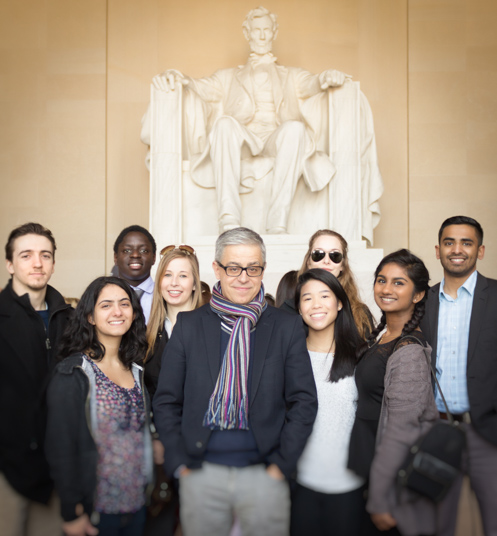- Future Students
- Current Students
- Faculty
- Staff
- Alumni
- Others
Agora Fellows visit Washington
 For three months in the fall, a group of students gathered each week to read, talk and debate with one another about freedom. They’d come from different programs and years at the University of Guelph-Humber, but all had applied and been accepted into the Agora Fellowship, a reading group led by Assistant Vice-Provost, George Bragues. They read through John Stuart Mill and Adam Smith, and though they wrapped up their weekly meetings in November, they recently gathered again to take a trip to Washington, DC.
For three months in the fall, a group of students gathered each week to read, talk and debate with one another about freedom. They’d come from different programs and years at the University of Guelph-Humber, but all had applied and been accepted into the Agora Fellowship, a reading group led by Assistant Vice-Provost, George Bragues. They read through John Stuart Mill and Adam Smith, and though they wrapped up their weekly meetings in November, they recently gathered again to take a trip to Washington, DC.
“The whole purpose of the Agora Fellowship was to engage these students in intellectual questions about what freedom means, what are its limits, and what are its negatives,” says Dr. Bragues. “We went to Washington because it’s the capital of a country that was founded as an experiment in freedom and a place where decisions that affect freedom are made.”
The Fellowships’ eight students and Dr. Bragues traveled to the airport and flew Washington on a Friday, arriving shortly after noon. With just a few days to see the city, the group quickly set about seeing all of the city’s major landmarks. Visits to the Capitol Building, the Library of Congress and the Supreme Court were joined by trips to the White House, Lincoln Memorial and Washington Monument.
“We really tried to squeeze everything in to this trip, so we were really busy the whole time,” says Tomson Varghese, 4th-year Business student and an Agora Fellow.
Along with sightseeing, the Fellows found time to take part in a conference hosted by Students for Liberty, a group dedicated to promoting discussions of freedom on campuses around the world. At the conference they heard presentations and took workshops from activists and intellectuals, and were able to put to work the content they’d been reading as part of the Fellowship.
“I think the thing I learned most from the whole Agora experience was the importance of free speech and how argument can lead to better understanding,” Tomson says. “Whenever two people have different opinions and talk about them with mutual respect, ideally, the end result is that they both see the issue differently.”
Applications are now open for the fall semester’s Agora Fellowship. This year’s theme will be happiness, and the reading list includes Adam Smith’s Theory of Moral Sentiments and Aristotle’s Nichomachean Ethics.
Applications can be found on the group’s webpage and are due on March 31.

